Ravnica Allegiance Mechanics
Good news, Planeswalker! Even though tensions are ramping up, Ravnica hasn't descended into total chaos yet. A few months ago, Guilds of Ravnica gave us a look at five of the ten guilds, and Ravnica Allegiance rounds out the group by featuring Orzhov, Gruul, Simic, Azorius, and Rakdos. Even if your chosen guild has stepped out of the spotlight this time around, there are great cards in all colors, not to mention powerful artifacts and lands.
Each guild has its own signature mechanic, and this article gives you a first look at how they play. Let's dive in!
The Cult of Rakdos and Spectacle
Nobody makes it clear that the populace isn't going to control itself quite like the Cult of Rakdos. They are showmanship, violence, and anarchy blended into a chaotic smoothie. It's time to drink up, kids. The spectacle is here.
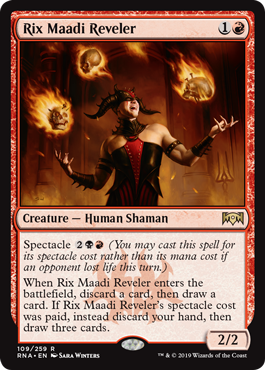
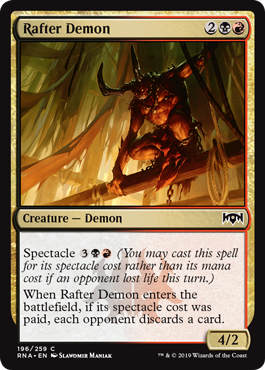
Spectacle, the new Rakdos keyword, gives spells an alternative cost. You can cast a spell for its spectacle cost if an opponent lost life during the turn. On some cards, the alternative cost is a discount, a reward for hurting your opponents. For other cards, such as Rix Maadi Reveler and Rafter Demon, the spectacle cost is higher, but there's an additional reward for paying that cost. Paying a spectacle cost is always optional, even if an opponent lost life that turn.
There are several ways for an opponent to lose life. Damage causes loss of life, as well as effects that have an opponent lose life directly. In addition, if an opponent pays life for any reason during a turn, that also counts. If their life total went down during the turn, they lost life. Note that the opponent could also gain life in the same turn, but that doesn't stop you from casting a spell for its spectacle cost. For example, if an opponent starts at 12 life, is dealt 3 damage, and later gains 5 life all in the same turn, your spectacle costs are a go.
Spectacle itself doesn't change when you can cast a spell. Just because an opponent loses life on their turn, it doesn't mean you can cast either of the two barrels of fun pictured above. As creatures without flash, they're confined to your main phase unless something else says otherwise.
Even if you pay a spectacle cost, the mana cost and converted mana cost of the spell don't change. Rix Maadi Reveler's converted mana cost is 2, either way you pay. It also doesn't matter how much life the opponent lost or even how many opponents lost life. The spectacle cost remains the same.
If the Rakdos love anything, it's ticket sales, so sharpen your knives and make sure your insurance is up to date. The circus is in town.
The Orzhov Syndicate and Afterlife
The Orzhov Syndicate has interests across Ravnica, from financial to spiritual, extending even into the afterlife. Just because someone's mortal form has diminished into disuse, the spirit within may be free . . . free to serve, that is. The new keyword afterlife gives some Orzhov creatures supernatural staying power.
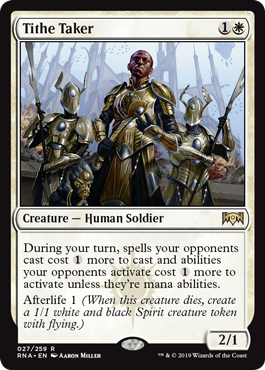
Afterlife is a triggered ability and includes a number. For example, Tithe Taker has afterlife 1. Some creatures have higher afterlife numbers. When a creature with afterlife dies, create 1/1 white and black Spirit creature tokens with flying. The number tells you how many 1/1 Spirits you get.
Afterlife triggers only when the creature dies, meaning "goes to the graveyard from the battlefield." If it's exiled directly from the battlefield or similar, afterlife won't trigger. Remember that blockers are chosen all at the same time, meaning if you block with a creature with afterlife and it dies, the Spirit(s) won't show up in time to block in that same combat.
If the Orzhov love anything, it's advantage, so get your forces under contract and put their spirits to work for you.
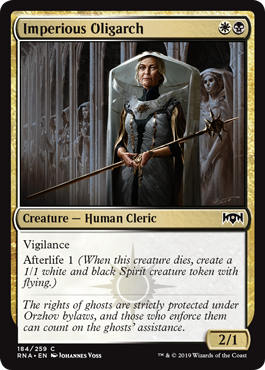
The Simic Combine and Adapt
Life is beautiful, and for the Simic, a reasonable starting point. Everything can be improved upon, engineered from paltry to perfection. Ravnica's a strange place these days, and the threats are unpredictable. If the Simic are to stay ahead of the curve, they need to constantly adapt.
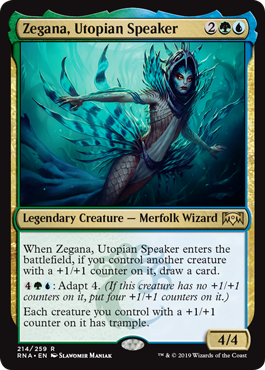
Adapt is a new keyword action, as seen on our old friend Zegana, Utopian Speaker. Adapt is followed by a number. To adapt, first check if the creature has any +1/+1 counters on it. If it does, adapt has no effect. If it doesn't, put a number of +1/+1 counters on it equal to the adapt number. One nice feature is if a creature loses its +1/+1 counters (and there may be some advantageous ways to accomplish that in this set), it can adapt again and pick up more.
Having +1/+1 counters has the obvious effect of making a creature larger, but the Simic have worked in some added bonuses as well. Zegana is happy to lead your +1/+1 counter–bearing army in a trampling romp over any who would stand before her.
If the Simic love anything, it's taking an advantage and making it even better. Maybe adding some wings, or some extra elbows somewhere. Just look at this little fella.
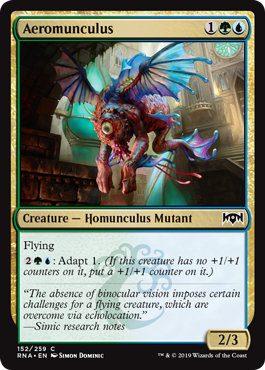
The Gruul Clans and Riot
The Gruul Clans are a loosely affiliated group of rampaging conquerors. Not the sort you really want as neighbors. They're reacting to the icy political climate on Ravnica the best way they know how: rioting. The new keyword riot gives your creatures your choice of a size boost or a speed boost.
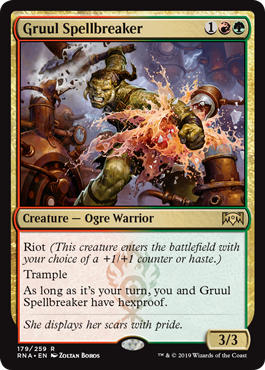
A creature with riot enters the battlefield with a +1/+1 counter on it or with haste, its controller's choice. This choice is made as the creature enters the battlefield, so no one can respond to the choice. So, Gruul Spellbreaker could be a 4/4, or it can swing right away as a 3/3.
The creature will have the chosen bonus the moment it enters the battlefield. If you choose to have the creature gain haste, it keeps haste even after the turn ends. This could matter if another player gains control of the creature later. Smash your enemies before that happens!
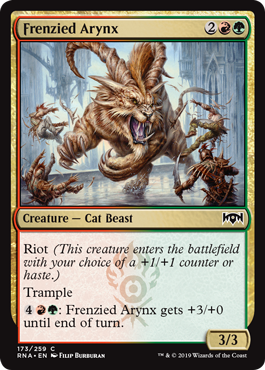
In some uncommon cases, a creature entering the battlefield could have two instances of riot. In those cases, you choose separately for each riot. For example, if a creature has two instances of riot, you could have it enter with two +1/+1 counters, one +1/+1 counter and haste, or two instances of haste. Two instances of haste doesn't do anything more than one instance of haste, but it might scare your opponents. RAWR!
The Gruul don't care about stupid taglines. Just crush it.
The Azorius Senate and Addendum
The Azorius Senate is centered on law and order. They want to control the populace, as it's quite clear the populace isn't going to control itself. One of their tools is legislation, and enforcing a proper time and place for most activities. But even the densest piece of jurisprudence can have addenda.
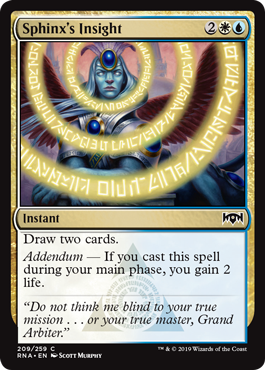
Addendum is a new ability word. Ability words don't have any inherent rules meaning, so addendum is more of a label than anything else. It's found (mostly) on instants that have additional or alternative effects if you cast the spell during your main phase. So, if you're willing to give up a little flexibility, you are rewarded with extra potency.
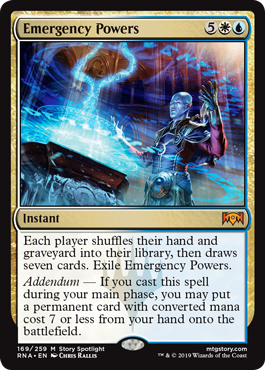
Here's Emergency Powers. It has a splashy base effect, and you may find it better to wait until your opponent's end step, refilling your hand just in time for you to untap. But if you're willing to commit seven mana during your main phase, you get the addendum effect, giving you a free permanent with converted mana cost 7 or less.
Read each addendum card carefully so you know exactly how each one works. The word "instead" in the addendum ability indicates a self-replacement effect, meaning you won't get the base effect, just the upgraded one.
If the Azorius love anything, it's probably mandated by statute. Best comply.
Split Cards
Ravnica Allegiance continues the two cycles of split cards started in Guilds of Ravnica. Don't adjust your screen. They actually look something like this:
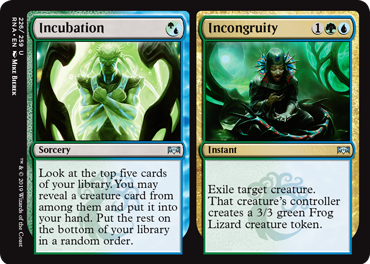
These guild-based split cards include a hybrid multicolored half and a traditional multicolored half. We interrupt this section for a quick refresher on hybrid mana.
Hybrid Mana
A hybrid mana symbol can be paid by one of its two component colors. For example, a cost of g/u (as seen on Incubation, above) can be paid by either one green mana or one blue mana. A spell with a hybrid mana symbol in its mana cost is both of that symbol's colors. Incubation is a green and blue spell, no matter what mana you use to cast it. Hybrid mana gives you great flexibility when considering what cards to include in your deck. And now, back to split cards.
Split Cards
If you've never played with split cards before, here's a quick refresher. They're essentially two cards in one. As you cast a split card, you choose which half you're casting. While the spell is on the stack, only that half is considered. The half you're not casting is just ignored. A split card is always a single card. For example, if you are instructed to discard two cards, Incubation // Incongruity counts as only one of them. While not on the stack, a split card has the combined characteristics of both halves. This means that while it's not on the stack, Incubation // Incongruity has a converted mana cost of 4. (This might be a change from the last time you played with split cards.)
Fantastic Allegiances and Where to Find Them
All ten guilds and their signature mechanics from our latest return to Ravnica are now in play and will be in your hands soon. We've barely scratched the surface on Ravnica Allegiance preview season. Keep checking back here and with the many folks we've made allegiances with around the world. Enjoy!

